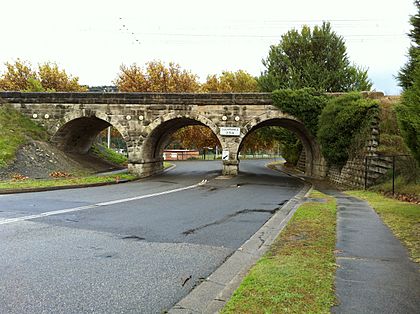Lithgow Underbridge facts for kids
Quick facts for kids Lithgow Underbridge |
|
|---|---|

The underbridge, pictured in 2011
|
|
| Coordinates | 33°28′55″S 150°09′07″E / 33.4819°S 150.1519°E |
| Carries | Main West Line |
| Crosses | James Street |
| Locale | Lithgow, City of Lithgow, New South Wales, Australia |
| Other name(s) | Lithgow (James St) Underbridge |
| Owner | RailCorp |
| Characteristics | |
| Design | Arch underbridge |
| Material | Sandstone |
| Pier construction |
|
| Longest span | 6.1 metres (20 ft) |
| Number of spans | 3 |
| History | |
| Designer | John Whitton; Engineer-in-Chief for Railways |
| Construction end | 1869 |
| Official name: Lithgow (James St) Underbridge | |
| Type: | State heritage (built) |
| Designated: | 30 August 2013 |
| Reference #: | 1831 |
| Type: | Railway Bridge/ Viaduct |
| Category: | Transport - Rail |
| Builders: | P. Higgins |
The Lithgow Underbridge is a special railway underbridge in Lithgow, Australia. It carries the Main West Line over James Street. This bridge was built in 1869 by contractor P. Higgins. It was designed by John Whitton, who was the main engineer for railways at the time. This historic bridge is also known as the Lithgow (James St) Underbridge. It is owned by RailCorp, a government agency in New South Wales. The bridge is about 156 kilometers (97 miles) from Central railway station in Sydney. It was added to the New South Wales State Heritage Register in 2013 because it's an important part of history.
Contents
A Look Back: The Bridge's History
The Main West Railway Line connects Granville to Bourke. This important railway line was finished in 1885. By 1900, some parts of the railway network were very busy. This included the famous Zig Zag near Lithgow.
The railway line through Lithgow was made into a double track in 1891. It was extended to Wallerawang with double tracks in 1922.
John Whitton, the chief railway engineer, wanted to use strong metal girders for bridges. However, he didn't get enough money for them. So, he decided to use stone arches instead. The Lithgow Underbridge is the second oldest railway arch bridge in New South Wales built for two tracks.
The James Street railway bridge was built in 1869. It was part of the railway extension from Lithgow to Bathurst. This extension was completed in 1875. Other bridges on this line were built for single tracks due to money limits. But the James Street bridge has always kept its original job, even as other bridges were updated.
What the Bridge Looks Like
The Lithgow Underbridge is a sandstone arch railway bridge. It has three spans and can carry two railway tracks. The middle span is about 6.1 meters (20 feet) wide. It stands on solid stone piers and abutments.
The bridge also has a low stone parapet along its sides. The arches are shaped like half-circles. They connect to the piers at special stone parts called imposts.
Bridge Condition and Changes
As of 2009, the bridge was in good condition. However, there were some small cracks and wear in the stone arches. Also, the parapets were a bit out of line, and some mortar was missing.
The James Street Underbridge is still very much like it was when it was built. It has kept its original parts in good shape. Over time, some anchors were added to the walls next to the arches. A concrete retaining wall was also built nearby.
Why This Bridge is Special
The James Street Underbridge is very important for its history. It is the second oldest stone arch railway bridge in New South Wales that is still being used today.
The bridge was designed by John Whitton. He was the chief engineer for railways from 1856 to 1890. Whitton is often called the "Father of New South Wales Railways." He helped create the main railway network in the state. This bridge is one of the few original Whitton-designed bridges still in use on the Main West Line.
The Lithgow Underbridge shows the special style and building methods used for stone arch bridges. This type of construction is quite rare in the railway network of New South Wales.
Historical Importance
The James Street Underbridge is historically important. It is the second oldest stone arch railway bridge in New South Wales still in use. It is also one of the few original bridges from John Whitton's time that are still used on the Main West Line.
Connection to Important People
This bridge is linked to John Whitton, a very important person in railway history. When he couldn't get money for expensive metal bridges, he chose to build strong stone arch bridges instead. The James Street bridge is a great example of his work.
Design and Building Skills
The James Street Underbridge is also special because of its design. It shows the excellent style and building techniques used for stone arch bridges. It is a good example of how railways were built back then.
A Rare Type of Bridge
Building bridges with stone, like the James Street Underbridge, is not very common in the New South Wales railway system. This makes the bridge quite rare and unique.
Showing Key Features of Railway Building
The James Street Underbridge is a good example of how railway viaducts (bridges that carry railways over valleys or roads) were built in New South Wales. It shows the main features of this type of construction.
 | John T. Biggers |
 | Thomas Blackshear |
 | Mark Bradford |
 | Beverly Buchanan |

